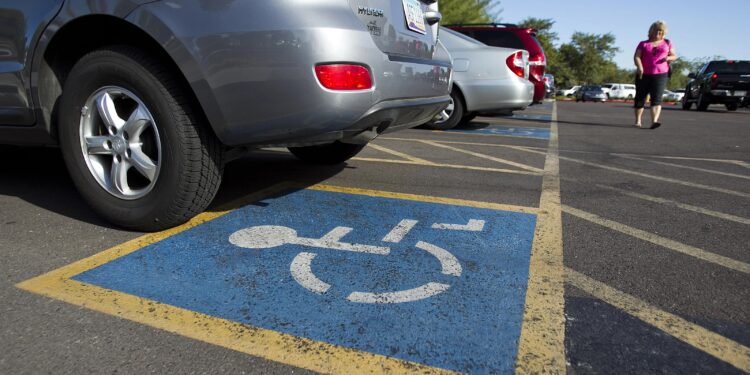All human life can be found on the dreaded school class WhatsApp. I was reminded of a chilling exchange when it was reported, a few days ago, that a record number of 730,000 children receive disability benefits after a surge in autism and ADHD diagnoses. Like the best of parochial rows, the school WhatsApp exchange touched on issues of national importance: who is really disabled?
“A gentle reminder that the disabled parking bay is for people with GENUINE blue parking disability badges,” read the first WhatsApp message. It’s a picture-perfect village primary, where children walk from the village hall car park, past the cricket pitch and a large field of sheep, to the small Victorian school. There are disabled spaces also at the back of the carpark, but the disabled spot at the front is prime; it is generally occupied by a small grey car containing a mother and her son. In the window of the passenger seat is a square blue badge: “Disabled Child Onboard,” affixed with a translucent sucker. It can be bought for £6.99 on Amazon.
The inevitable WhatsApp followed: “Not all disabilities are visible.”
An immediate reply: “But genuine blue badges should be.”
“My son suffers sensory issues.”
“My daughter is in a wheelchair.”
“He prefers to be closer to the park and stride”
The parent WhatsAppers got serious, and a ‘Whole School’ letter from the Headteacher followed, reminding everyone not to use the disabled bays unless they were owners of a genuine blue badge. An unseemly squabble about competing conditions then unfolded – won, to all neutral observers, by the careworn mother of the child in the wheelchair.
And yet, the following day, the small grey car with the illicit disabled badge was brazenly parked in the disabled spot again and remained in place for the whole term.
What could have been done? We’re not the sort of community where verbal rows are ever had in village hall car parks. Besides, the mother of the illicit blue badge is a big woman who obviously believes her child is disabled, despite lacking an official medical diagnosis.
What impulse is this – to label a child ‘disabled’ when they do not meet the medical criteria for such? Why the pride in broadcasting your son’s ‘sensory difficulties’ to the class WhatsApp? Why the mindset that lionises the weakest side of a child to the extent a fake disabled badge is purchased? Why reduce a child to a disorder? Surely, at some point the boy will say to his mum, “But I’m not disabled.”?
According to the above report, claims to support children with ‘behavioural disorders’ have more than doubled to 182,000 since before lockdown. This gives rise to inevitable questions over whether these behavioural disorders are biological or social in nature. But, the well child made sickly by their either vicious, inept or misguided parents is one familiar to readers of children’s literature. Just think of poor Colin in The Secret Garden or Clara in Heidi.
And what is the worse thing about this rush to label well children disabled or disordered? That the children in actual wheelchairs, who are in need of help, are shunted to the back of the carpark.
Joanna Gray is a writer and confidence mentor.













To join in with the discussion please make a donation to The Daily Sceptic.
Profanity and abuse will be removed and may lead to a permanent ban.